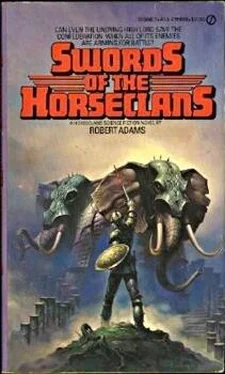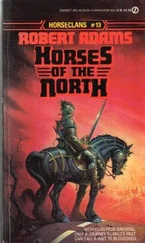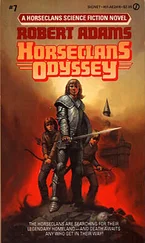So saying, he drew his dirk.
Lillian heard it all, heard both sides of the mutant’s conversation with the Senior Director, heard the order to destroy her transceiver—her only possible link with the Center—heard all their attempts to arouse Zastros’ body; though she felt each and every excruciating agony and screamed almost incessantly, no single sound emerged from the body’s lips. Then she heard Milo’s last words, heard his weapon snick from its case.
She felt fingertips move on the chest, locate the spot and lift away, to be replaced by the knife point. Then she was silently screaming out the unbearable anguish of the cold, sharp blade entering the body’s heart; unmoving, she writhed in pain as he jerked the double-edged weapon, slicing the organ to speed death.
Frantically, Lillian cast about, seeking a sleeping or unconscious body—any body, human or otherwise—fruitlessly. Faintly, she heard voices and the clumping of heavy boots. Then there was silence.
Thus, did Dr. Lillian Landor (holder of four degrees), who had hated all male humans for most of the seven hundred years of her life, at last meet death … in a man’s body.
Early in that month called Thekembrios, Milo and Mara lay reclined upon a mound of cushions, sipping cordials and gazing into the heart of a crackling, popping wood fire. The evening had been one of those rare occasions on which they had been able to dine alone, in their suite, and the remains of the meal littered a table nearby.
He tried to enter her mind, failed, and said aloud, “What are you thinking of that you must shield your thoughts?”
She smiled ruefully. “Sorry, Milo. We must shield our thoughts so much of our days, you know. But I didn’t mean to shut you out.
“No, I was thinking of you … in a way. I was thinking of the first winter I spent with you in that damned drafty tent at Ehlai. God, it was horrible: that arctic wind knifing in off the ocean, fleas hopping on every living creature in the camp, and the smells, ugh—the atmosphere inside those tents was enough to sicken a hog or a goat, smoke and sour milk and wet wool and filthy, unwashed human bodies. You should have warned me beforehand what a winter camp was going to be like. Nothing even resembling a real bath for months; Milo, I thought I’d never be able to get the stink off and be clean again!”
Milo took a sip of his cordial. “I don’t recall any complaints from you then, Mara.”
She laughed throatily. “Of course not, silly. I was in love with you—violently, passionately in love with you. Then, the cold and the stink and the fleas and the filth still added up to paradise … just so long as you were there. We women are like that in the first flush of love.”
“And now, Mara?” He rolled onto his side to face her.
“That was forty years ago. How much do you love me now?”
“Not that much, Milo. That kind of love can never last very long; it’s too intense, too demanding, too abrasive on the emotions of both parties. But I do love you still, Milo. Ours has become a … a comfortable relationship for me. And what of you, my lord?”
Before he answered, he drained the cordial and tossed the silver goblet in the general direction of the table, then rolled onto his back, pillowing his head on his crossed arms, but with his face still toward his wife.
“I didn’t love you, Mara, not then, and I think you knew.”
She nodded her head slowly, and the fire threw highlights from the blue-black tresses that rippled about her shoulders.
“I knew. But it didn’t matter, not then.”
“For a long while, Mara, I didn’t know if I could ever love you. Not that you were hard to love, that wasn’t it. But I feared that my ability to love might have atrophied. I’d been afraid to love any woman for so long, you see.
“It’s bad enough with a woman you simply like and respect—watching her, day by day, year by year, grow old and infirm and finally die. When you love that woman, it’s the crudest of tortures. After having suffered that torment a couple of times, Mara, I willed myself not to love.
“But, over the years, I have come to love you, my lady. Not a fiery, passionate love, but a love that has come slowly into being. It is nurtured by my respect for you and my admiration of you, by my faith in your honesty and by the pleasure that your dear companionship has given me. Our relationship is, as you said, a most comfortable one. I am comfortable, Mara, and I am very happy. You made me happy, darling, and I love you.”
Resting her hand on his cheek, she whispered, “I’m glad you remembered how to love, my Milo, and now that the southern Ehleenoee are all reunited and there will be peace …”
“Hah!” he exclaimed, sitting up. “Peace, is it, my lady? Such peace as we have now will last until spring, possibly. Let us hope it’s not an early spring, for Greemos and I have much to do.” _
Mara arched her brows. “Greemos? But he is King Zenos’ Strahteegos.”
“So he is,” agreed Milo, “but only until the first day of Martios. On that day, I will take his formal oath as the Confederation’s new Strahteegos of Strahteegoee. Then he and I will ride north and look over the ground on which the army will probably be campaigning.”
“But Gabos …” she began. “He has served us well, and when he hears …”
“Gabos was among the first to know, Mara, and he heartily endorses the move. He’d never admit openly to the fact, of course, but he, of all men, is fully aware that he’s getting too old for long campaigns. I’m kicking him upstairs. Week after next, at the Feast of the Sun, I’m investing the old war horse with his new title—Thoheeks of the Great Valley.
“That’s the only way that well ever really secure it, you know. It must be settled and cultivated. I plan one large city and two smaller ones and the majority of their citizens will be, like Gabos, retired soldiers. If they’re unmarried, they’ll be encouraged to take wives from among the mountain tribes. It worked for the Romans; it should work for me.”
“Romans?” repeated Mara puzzledly. “A very warlike people who flourished roughly twenty-four centuries ago, Mara. When they had a difficult frontier to defend, they settled it with old soldiera wed to barbarian girls, which proved quite an effective means of gradually amalgamating their enemies into their empire, as well as providing a certain source of tax revenues rather than expenditures and, at the same time, a virtual breeding ground for the next generation of soldiers.”
Suddenly, Mara gurgled with laughter. “Oh, Milo, I just pictured the Lady loanna as a country thoheekeesa, milking goats instead of coupling with them! Why, she can’t even ride; she’ll be lost outside a city.”
“Which is probably why,” announced Milo, “she has been begging Gabos to divorce her, offering him fantastic sums to do so. I advised him to hold out for the highest figure he can get from her, and then to grant her wish. I’ve already arranged for Gabos to marry Grand Chief Shoomait’s youngest daughter. I’m reliably informed that the girl is a nubile fourteen, attractive, intelligent, and personable, and Gabos is not of such an age that he can’t beget a few heirs. It’s said the girl is the apple of old Shoomait’s eye—and God knows she cost the Confederation a high enough bride price. So I think’ the old bastard will keep his own brigands and the other tribes in check; he’s not going to raid his own daughter’s lands or try to destroy the inheritance of his grandchildren.”
“My, my, husband,” teased Mara, “you were certainly a busy little High-Lord during those six weeks I spent in the country—creating a new duchy, planning new cities, abetting in the blackmail of an heiress, raiding the Confederation treasury to buy a fourteen-year-old bride for a fifty-year-old man, and arranging to get a Hew Strahteegos just in time for your new war. Tell me, dear heart, who are we fighting this time?”
Читать дальше












